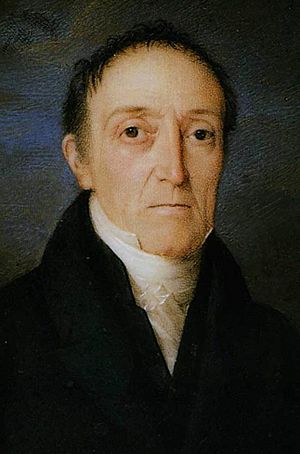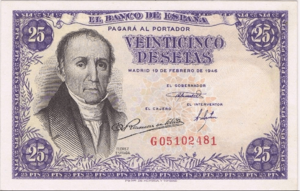Álvaro Flórez Estrada facts for kids
Álvaro Flórez Estrada (born in Pola de Somiedo, Asturias, in 1765 – died in Noreña, Asturias, in 1853) was an important Spanish economist, lawyer, and politician.
Contents
Early Life and Career
Álvaro Flórez Estrada first studied humanities. Then, he studied Law at the University of Oviedo. After finishing his studies, he moved to Madrid. There, he became a magistrate, which is like a judge.
When he was thirty, he was put in charge of the country's money as the treasurer-general of the Kingdom. This was a very important job. However, he soon resigned because he believed in liberal ideas. These ideas meant he wanted more freedom and rights for people. He felt his job didn't fit with these beliefs.
He went back to Pola de Somiedo. But in 1798, the General Board of Asturias asked him to be their attorney general. This meant he was their chief legal officer.
Fighting for Freedom
In 1808, Asturias rose up against Napoleon's invasion. Flórez Estrada believed that fighting the invaders also meant having a political revolution. He helped write the official announcement for the local government, called the Junta. He also wrote a document asking for help from the King of England.
When the Junta was dissolved, Flórez Estrada had to escape to Seville. He wanted to tell the main government, the Central Board, what had happened. He lived in Seville and Cádiz for a while. During this time, he wrote a plan for a new, liberal constitution, which meant a government with rules and rights, but still with a king.
He then traveled to London. In 1810, he published books there. These books shared his ideas about the revolution in Spain and the problems between America and Spain.
In 1812, he became a deputy in the Cortes of Cádiz. This was a special parliament that created Spain's first constitution. In Cádiz, he also started a liberal newspaper. In 1813, he became a Military Intendant in Andalusia. This was a role in charge of military supplies and finances. Soon after, he left this job to study history, languages, and economics.
Later Life and Contributions
Because he was part of the Cortes of Cádiz and other groups, he had to leave Spain in 1814. King Fernando VII had returned and threatened to punish him. So, Flórez Estrada went into exile in London again.
While in London, he met famous English economists like David Ricardo and Adam Smith. He helped bring their ideas to Spain. He even went to Rome to ask Charles IV to become king again, but only if he accepted a constitutional monarchy. This meant the king would rule under a constitution.
In 1818, he wrote an important letter to the king. It defended the Cortes and was printed in London in 1819. When it was published in Spain, it helped people get excited about a constitutional government again. This helped Rafael Riego decide to start his military uprising in 1820.
After the Constitution was announced again, Flórez Estrada returned to Spain. He tried to put some of his economic plans into action. He was elected as a deputy for Asturias in the Cortes. He strongly defended freedom, including freedom of the press, political freedom, and freedom of trade.
In 1822, he worked with Francisco Martínez Marina to write the first draft of the Spanish Penal Code. This was a set of laws for crimes and punishments. On March 3, 1823, he became a Minister of State. But the next month, a French army arrived, forcing him to flee to London again. This exile lasted ten years.
Economic Writings
During his time in exile, he wrote important books on economics. These included:
- Efectos producidos en Europa por la baja en el producto de las minas de plata (European effects from the decline in silver mine production)
- Examen de la crisis comercial de Inglaterra (Examination of the English commercial crisis)
- Curso completo de economía política (Complete course of political economy)
He returned to Spain when King Fernando VII died. He became involved in politics again. He represented Asturias in parliament from 1834 to 1840. He supported the idea of Juan Álvarez Mendizábal's Ecclesiastical confiscations. This was when the government took land from the church and sold it. He wrote a book about this in 1836. He also wrote Elements of Political Economy, which was a textbook used in Spanish-speaking countries for many years.
In 1846, he was appointed a life senator. This meant he would be a senator for the rest of his life. He died at the age of eighty-seven in 1853.
Memorials
Álvaro Flórez Estrada's name is on a monument in Oviedo. This monument honors important economists and financiers from Asturias. The Museum of Fine Arts of Asturias has a small painting of him.
His picture was also on the 25 pesetas banknotes printed by the Bank of Spain in 1946. His manor house in Somiedo was on the back of the banknote.
See also
 In Spanish: Álvaro Flórez Estrada para niños
In Spanish: Álvaro Flórez Estrada para niños
 | Georgia Louise Harris Brown |
 | Julian Abele |
 | Norma Merrick Sklarek |
 | William Sidney Pittman |



